- Home
- P. T. Deutermann
Pacific Glory Page 5
Pacific Glory Read online
Page 5
Then he was underwater as the explosion plume from the first torpedo collapsed over the flight deck, dumping thousands of gallons of water down the hatch, washing him clean out of the vestibule and swirling like a drunken spider along the passageway until a knee-knocker stopped him short with an ugly sucker punch to the gut.
He tried to catch his breath, but almost nothing was coming from the canister. He looked up: The Roman candle was out. He realized he only had a minute. He scrambled like a crab along the deck, sloshing through warm saltwater, then scrambled up the ladder and finally into the vestibule, where he spilled out onto the flight deck like a sack of potatoes. An instant later, the Roman candle lit back off, belching a plume of fire thirty feet into the air from the hatch. He found himself rolling because the flight deck was no longer level—the big ship was developing a distinct port list. He rolled into the tie-down chains of a parked aircraft, ten feet from the portside catwalks.
He wiped the mask off his face and breathed in honest seagoing air, even though it was laced with gun smoke from the nearby catwalk AA batteries, which were still blasting away. He wiped his stinging eyes and looked out to sea. Here came yet another torpedo bomber. With his left leg still entangled in the tie-down, he could only watch in fascination as the gunners’ tracers converged on the black plane a few thousand feet off the port side, then cheered when it exploded in a white-hot fireball as the twenty-millimeters found the torpedo warhead slung under its belly. The only surviving fragment of the airplane, the radial engine with its spinning propeller still attached, came directly down at the ship and then clattered onto the flight deck like a saw blade fifteen feet from where he lay. The spinning prop dug big chunks of wood out of the deck, one of which whacked him in the arm before the engine cartwheeled its way right over the far side.
Mick lay back, laughing hysterically, and that’s how one of the flight deck fire parties found him, knees-up under a badly riddled fighter, lying in a soaked, scorched ball, still laughing about that lone propeller’s last fling.
“Crazy fucking aviator,” one of the damage control team guys muttered as they scooped him into a Stokes litter. The masts of a cruiser became visible above the canting flight deck as she came alongside to begin taking off the wounded.
THREE
Pearl, September 1942
Two and a half weeks after the debacle at Savo Island, Winston’s survivors finally made it back to Pearl. All of the survivors from the four lost cruisers had been taken to Espiritu Santo, a primitive logistics base on an island near Guadalcanal. From there they put them on one of the converted ocean liners serving as troop transports that had brought out reinforcements for Guadalcanal. Sixty-seven more men died of their injuries on the trip back and were buried at sea. In the time it took them to get back to Pearl, there were burial-at-sea ceremonies every third day. It felt to Marsh as if they were leaving a trail of bloodstained mattress covers, weighted down with firebricks from the ship’s boiler rooms, all the way back across the South Pacific.
Of the nearly twelve hundred crew in Winston, they had lost almost four hundred known dead or missing and presumed dead. The other ships had suffered similar losses. Because the transport carried the survivors from four ships, it took several days to get an organized count. The senior officer to make it off Winston was the executive officer, Commander Jerry Wilson. Captain McClain had been torn to pieces by a shell hit directly on the bridge. The XO organized Winston’s survivors into three groups: able-bodied officers, chiefs, and enlisted men; the injured but ambulatory; and the grievously injured. Marsh fell into group two, in that he could hobble around even though his hands weren’t much use. He was the senior surviving officer in the gunnery department, which was a sobering thought, especially when he found out that of nearly three hundred in the department, only a hundred and fifty were left. The rest were littering the bottom off Savo Island or entombed in the wreck of their ship. That’s what happens when you lose a sea-fight, the exec said: unlike in the Army, there’s no retreat and regroup option.
Doctors from the naval hospital came aboard to do triage when the transport docked at the shipyard’s ten-ten dock just after sunset. The naval authorities in Pearl planned to put the ambulatory survivors in barracks over in the Hickam Field housing area, within walking distance of Hospital Point. Marsh was tasked by the exec to be one of the escorts for the most seriously wounded, who would be going to the hospital itself. The ship’s doctors had put plaster casts on his wrists, but there wasn’t much they could do for his knees other than Ace bandages. Once he got to the hospital, he could see that there was barely room for all the new casualties. There hadn’t been enough ambulances available, so they’d ended up taking some of the badly wounded over to the hospital on the back of Army stakebed trucks.
Marsh could actually smell the hospital as they pulled into the parking lot. The usual Hawaiian ambience of blooming flowers, swaying palm trees, and gentle sea air was overwhelmed by the stench of disinfectant, vomit, and burned human flesh coming from the building, overlaid with the reek of fuel oil that still covered much of the surface of Pearl Harbor itself. It had been almost eight months since the attack, but there was still plenty of evidence lying out in the harbor, crowned by the blackened remains of the battleship Arizona’s superstructure over near Ford Island.
The medical staff met them at the door, looking like shell-shock casualties themselves. Doctors, nurses, and pharmacist’s mates, gray-faced and pouch-eyed, stared at the incoming trucks with exhausted expressions as the stretchers were unloaded. The men were trying hard not to hurt or jostle anyone. Inside the smells were even worse. The hospital staff had commandeered tables from the officers’ club because they had run out of gurneys, so most of the new casualties were laid out right there in the main hallway. With his forearms out of action, Marsh could only stand around and “supervise.” All the windows had blackout curtains rigged, which didn’t help with the ghastly smell. There was plywood boarding up the windows all along the harbor-side walls, where the office and admin spaces had been shattered by machine-gun bullets.
“Leave it to the Japs to machine-gun the hospital,” Marsh remarked to one orderly.
“They were fresh out of bombs,” the man responded bitterly. “Welcome to Pearl.”
* * *
Two weeks later Marsh was summoned to appear before the Court of Inquiry being held at the naval base headquarters. His wrists were healing, but his knees made walking a true misery. They worked fairly well during the day, but at night they seized up like rusty hinges, making mornings really tough. Serious painkillers were reserved for badly wounded men in the hospital. All they could give him was APC pills. The C in an APC was for caffeine, so at night his choices were staying awake for hours or trying to sleep with two campfires in his knees. When he did sleep, he had nightmares, which inevitably ended with the blackened superstructure of Winston rolling over on him. He was physically and mentally exhausted by the time the call came to testify.
Marsh thought they’d been sent back to Pearl to recuperate and heal. For the enlisted that was mostly true. The surviving officers, however, were busy night and day dealing with the aftereffects of losing a heavy cruiser. Of the seventy-two officers assigned, forty-one were left, and twelve of those were in the hospital. The rest of them were swamped with re-creating operational reports, making inventories of accountable equipment, writing condolence letters, and checking on their hospitalized shipmates to make sure they were not getting lost in the organized chaos that was the naval hospital. Individually, they all had to recover their own personal situations. Being a bachelor, Marsh had essentially lived aboard ship. It was a great way to save money, but it meant that he’d lost everything when Winston went down. He now had to acquire new uniforms, underwear, shoes, insignia, an ID card, and a ration book and then draw up an inventory of personal possessions lost with the ship. He also had to regenerate his service and medical records from memory. After two weeks of picking up the pieces, he was almo
st ready to return to the relatively simpler port and starboard watches off Savo Island.
Almost, but not really.
He wasn’t very proud of his performance at Savo. They’d all talked about what might happen when untested Winston finally ran up against the battle-hardened Jap fleet. The enemy had a big base up at Rabaul, at the top of the Solomon Islands chain, which gave them what tacticians called interior lines of defense. The night after the main landings, four cruisers and a couple of destroyers found out what that meant. Now it was September, and the American Navy was still operating out in the Solomons at the end of a long, long logistical tether. So far in this war, Marsh knew that the Americans had had their asses handed to them twice, once at Pearl and again off Savo. The ships out there now were experiencing almost daily air attacks, submarine alarms, real and imagined, and running gun battles with Jap shore artillery. Enemy heavy cruisers were coming down the Slot regularly in search of another night-fight, which meant that every ship out there spent the night at GQ, tightening everyone’s emotional and physical bands.
The Marines ashore on Guadalcanal, of course, had it worse: The Navy ships would withdraw out of the amphibious support area when they learned of an impending nighttime visit from Rabaul. All the Marines could do was dig ever deeper into the muddy bowels of Guadalcanal when the offshore shelling began, hunkering down while their planes and equipment roasted in gasoline fires topside. People who’d been out there were telling stories of Marines who looked like walking zombies crawling out of bunkers in the morning to find that Henderson Field, scraped literally out of the jungle by the Japanese, was a collection of swimming-pool-sized craters and burning airplane parts. So, no, he decided, he was not really ready to get back out there, even though he knew that return was inevitable.
He discovered that sitting at that long green table in front of a Court of Inquiry was not pleasant. It really was green: They had draped a green felt tablecloth over a wardroom table. The members sat on one side and the lone witness on the other. The court’s stated purpose was to “inquire” into the circumstances surrounding the loss of Winston and the other cruisers, with “loss” being the operative word. Marsh had thought that the word referred to the fact that the ship had been lost at sea in combat, but the attitude of those grim-faced captains on the court was more like: You’re one of the officers who lost the Winston. Lost, as in transitive verb. We want to know why you did that.
A rear admiral from the Pacific Fleet headquarters staff was the president of the court, but he rarely spoke. The other members were four-stripers, and they did most of the questioning. As only a senior lieutenant, Marsh was just outside the main beam of the court’s attention, but he still had to answer a lot of questions about the particulars of the gunfight, damage control, what he knew about enemy dispositions the night before, the state of Winston’s equipment—in his case, the ship’s secondary battery of five-inch guns—and the overall state of readiness in the ship. Was the crew exhausted? Did the watch arrangements contribute to that? Had they trained in night surface engagements, and, if so, when and how often? Was the damage control effort well organized and effective, or did the crew simply fall apart and scramble over the side?
Marsh answered their questions as best he could, subconsciously defending his ship and her fleet reputation. Of course there had been problems. Every ship had problems—machinery breakdowns, incomplete training, not enough repair parts, the lack of fresh food, the physical exhaustion from eight months of all-out war—but he put the best face on it that he could. He could tell from the court members’ expressions that other Winston officers testifying before him had taken the same tack, but that didn’t seem to bother them. He guessed that what they were really looking for was a sense of the ship’s morale and fighting spirit. As four-stripers who’d all had command, they would have expected the same defense of their ship from their own officers and crew.
After three hours, the captain who had been questioning him asked if he had anything to add to what he’d already told them.
His knees had seized up again. Anxious to get out of there, Marsh said no, sir. Then they surprised him.
“Lieutenant Vincent, I have a question,” the president said. He looked positively ancient to Marsh, but there was nothing dull about those bright blue eyes that locked onto his like one of those Jap searchlights.
“Yes, sir?”
“Have you left anything out regarding what you did when you abandoned ship?”
Marsh tried to think, wondering if this was some kind of legal trap. He still wasn’t very proud of the way he’d joined that terrified mob of sailors in running for the lifelines, especially when the court had been asking about what role the ship’s officers played in executing an orderly abandon-ship.
“I don’t believe so, Admiral,” he said.
The president leaned back in his chair. “The court has been told,” he said, “that you went back aboard Winston just before she capsized. Is that true?”
“Uh, well, yes, sir.”
“Tell us about that, please.”
Marsh told them he’d heard men banging on a hatch and had gone back to open it, and that then they all got the hell away from the ship before she took them with her.
“How did you manage that with two broken wrists and knees?”
“My kneecaps were only cracked, sir,” Marsh said. “I kind of used my elbows to get aboard and climb up the deck, and then I used my feet to kick the dogs off the hatch. Some of them were already blown off, so it wasn’t as hard as it sounds.”
“Why didn’t you simply open the scuttle?”
“Oh, well, I’d have had to use my hands, sir. Besides, the operating wheel wasn’t round anymore. The deck up there on the foc’s’le was humped up and deformed. Otherwise, I think they could probably have gotten themselves out.”
“Indeed,” the admiral said. “But they didn’t. You got them out. You went back aboard and got them out. Right?”
Marsh thought about it for a moment, seeing where the admiral was going with this. “Sir,” he said, “when I first got topside, I was scared to death. The ship was obviously finished, and we were walking on bulkheads instead of decks. The Japs had one of those big searchlights right on us. I felt like it was centered on me personally, and then they fired a full main battery salvo and I about crapped my trou. I’d seen some guys helping their buddies over the lines, but me? I didn’t think. I didn’t wait. I didn’t help a single soul. I just slid through the lifelines like a rat as those eight-inch shells came in.”
“What’s your point, Lieutenant?”
“Well, the way I see it, Admiral, the fact that I went back aboard mostly just makes up for the fact that as an officer, the only leadership I displayed was getting into the water.”
Marsh couldn’t really look at their faces, but somehow it felt good to get that off his chest. He was still ashamed of how he’d cut and run.
“Mister Vincent,” the admiral said quietly, “you had every right to be terrified under those circumstances. That doesn’t make you a coward. Courage comes in many forms; what you did was not just courageous, it was valorous. Do you know the distinction?”
Marsh shook his head.
“Courage is when you function under fire. Valor is when you’re scared to death and your brain is screaming at you to run, and yet you still turn around and go back, in your case, to get some people out of a really bad bind. In other words, Mister Vincent, you did all right out there.”
Well, Marsh thought, that sounded good—but he still wondered if a couple more guys might have survived if he’d stayed on board to help them off. “Thank you, sir.”
“Very well, Mister Vincent. If the members have no further questions, that will be all, sir.”
“Thank you, sir.”
“You can go now, Lieutenant,” one of the captains said when Marsh just sat there.
“Yes, sir,” Marsh said. “As soon as I can get my knees unlocked.”
The captain g
ot up, came around the table, and helped Marsh to get up and then to stay up. A second captain took hold of his other arm, and together they got him walking. Marsh felt like a child. He was embarrassed and mostly wanted to disappear.
* * *
That afternoon after lunch he met with Commander Wilson, Winston’s exec, who had survived the sinking relatively unscathed, at least physically. Being a full commander, he rated his own room in the BOQ. When Marsh knocked on the door and went in, he found him sitting at his desk, which was piled high with paperwork. He was staring at a Naval Academy ring lying on his desk blotter. One side of the ring was the usual burnished gold; the other was encrusted with something black. He looked up at Marsh.
“I’ve got to clean this up some way,” he said, pointing to the ring with his chin. “Haven’t the foggiest notion how.”
Marsh saw that he was wearing his own ring, just as Marsh was wearing his. “Whose is it?” he asked.
“The captain’s,” Wilson said. “I took it off his finger when we abandoned. I’m going to send it back to Helen, his wife. The black stuff there is all that’s left of him.”
“Um,” Marsh said. “Are you sure it’s his?”
“I wasn’t when I retrieved it,” Commander Wilson said, “but I found the hand on the remains of the captain’s chair. Once I got time to examine it, I could read his name engraved inside.”
The hand. Marsh swallowed. “Can’t you just wash it off?”
“I suppose,” Wilson said.
Marsh suddenly realized that Commander Wilson wasn’t all there just then. He had dark pouches under his eyes, a nervous involuntary tic in the side of his face, and what Marsh was beginning to recognize as that thousand-yard stare the war correspondents talked about. “I guess my real problem is what to say in the letter.”
Marsh had been using the Navy’s standard formula in all of his condolence letters, adding a personal note if he knew the man well enough to get it right. There’d been over three hundred men in the gunnery department, and he certainly did not know every one of them. He could see where the Navy’s formulaic language probably wouldn’t be sufficient for a letter to the captain’s wife, especially with that ring. Realizing that the exec was emotionally exhausted, Marsh made a quick decision.

 The Nugget
The Nugget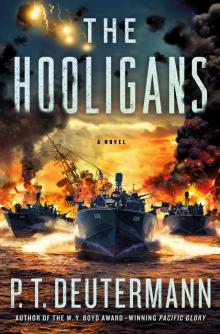 The Hooligans
The Hooligans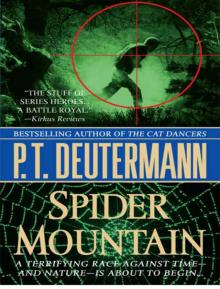 SPIDER MOUNTAIN
SPIDER MOUNTAIN![Cold Frame [retail] Read online](http://i1.bookreadfree.com/i/03/19/cold_frame_retail_preview.jpg) Cold Frame [retail]
Cold Frame [retail] Sweepers
Sweepers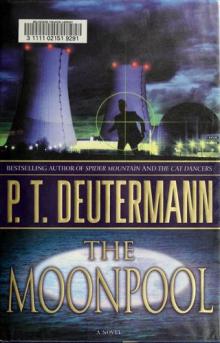 Cam - 03 - The Moonpool
Cam - 03 - The Moonpool Trial by Fire
Trial by Fire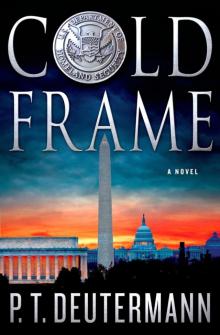 Cold Frame
Cold Frame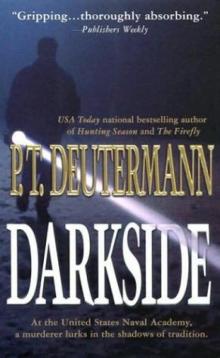 Darkside
Darkside Cam - 04 - Nightwalkers
Cam - 04 - Nightwalkers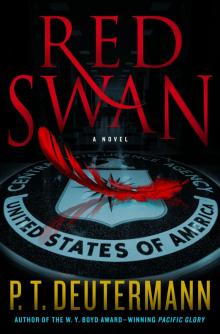 Red Swan
Red Swan The Commodore
The Commodore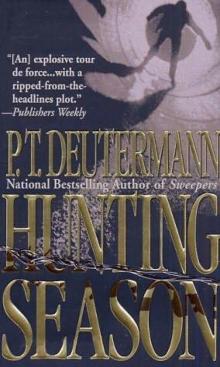 Hunting Season
Hunting Season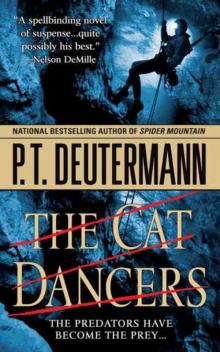 The Cat Dancers
The Cat Dancers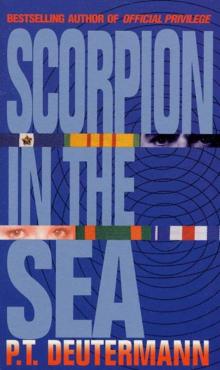 Scorpion in the Sea
Scorpion in the Sea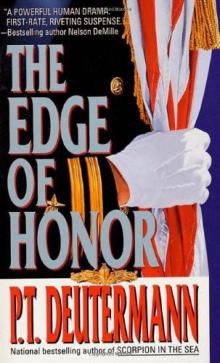 The Edge of Honor
The Edge of Honor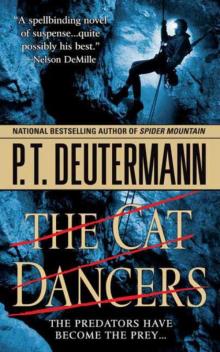 The Cat Dancers cr-1
The Cat Dancers cr-1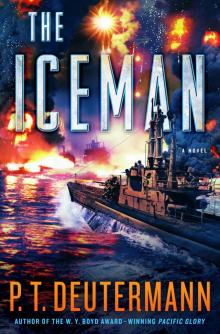 The Iceman
The Iceman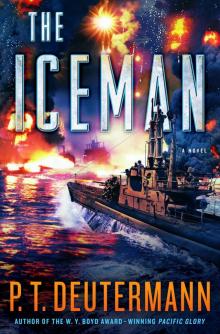 The Iceman_A Novel
The Iceman_A Novel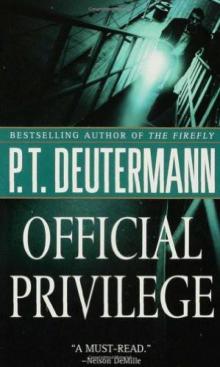 Official Privilege
Official Privilege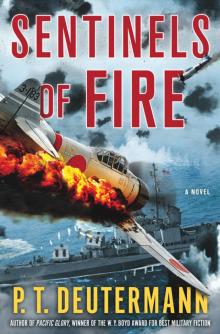 Sentinels of Fire
Sentinels of Fire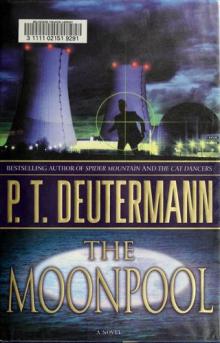 The Moonpool cr-3
The Moonpool cr-3 Nightwalkers cr-4
Nightwalkers cr-4 The Firefly
The Firefly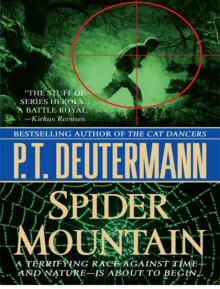 Spider mountain cr-2
Spider mountain cr-2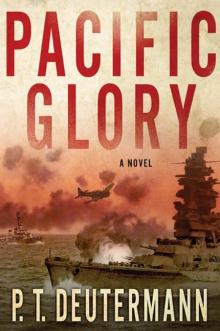 Pacific Glory
Pacific Glory The Last Man
The Last Man